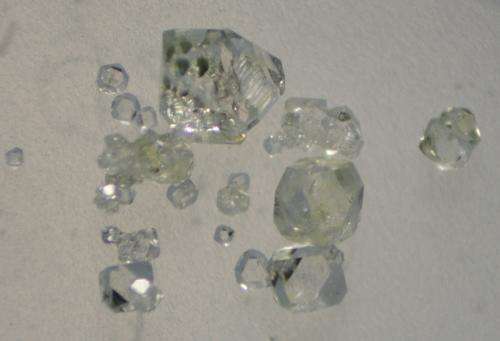September 2, 2013 report
Researchers find phosphate in more soluble form on Mars

(Phys.org) —A trio of researchers at the University of Nevada has found that phosphate found in minerals on Mars, is far more soluble than it is in natural Earth minerals. In their paper published in the journal Nature Geoscience, the researchers describe how they synthesized mineral types found on Mars and then tested how well they dissolved in water releasing phosphate as compared to samples from natural Earth minerals.
Most scientists agree that phosphate is a key ingredient for life. Put another way, they believe that life couldn't have evolved without it. For that reason, scientists have been studying ways in which minerals that contain phosphate could have broken down to allow the phosphate to escape. Such studies have thus far found that minerals that hold phosphate on Earth are not very soluble—they don't break down easily when soaked in sea water. That has led to what Earth scientists call "the phosphate problem." How did life get started on Earth if there wasn't enough phosphate around when life was first beginning? Some have suggested the answer is that it didn't, instead, it started on another planet, such as Mars, and made its way here via meteorites. Prior research has already shown that Mars has much more phosphate than does Earth. In this new effort, the team in Nevada looked at minerals that exist on Mars to see if they might be more soluble in water as well.
Lacking samples from Mars to test, the researchers synthesized chlorapatite and merrillite in their lab—two common phosphate bearing minerals found on the Red Planet. They then soaked samples in several tubs, each with a different pH level for varying amounts of time. As they did so, they measured how much phosphate made its way into the water and how long it took. In analyzing their results, the researchers found that more phosphate made its way into the water with both types of minerals and they did so at a faster rate than minerals that contain phosphate found naturally on Earth. In some cases, they report that the Mars rocks released phosphate up to 45 percent faster than Earth rocks.
The findings by the team don't prove that life began on Mars and migrated to Earth—after all, scientists have yet to prove life ever existed Mars. But it does add some credence to the argument that perhaps life did start somewhere other than our home planet, which if true, might mean it's still out there waiting for us to discover it.
More information: Readily available phosphate from minerals in early aqueous environments on Mars, Nature Geoscience (2013) DOI: 10.1038/ngeo1923
Abstract
If the chemistry essential to life was present in water-containing environments on Mars, the processes that led to life on Earth may have also occurred on the red planet1. Phosphate is one of the chemical nutrients thought to be essential for life and is also considered critical to reactions that may have led to life on Earth2, 3. However, low prebiotic availability of phosphate may have been a complicating factor in terrestrial abiogenesis2, 4, suggesting that a similar hurdle may have confronted the development of life on Mars. Phosphate available for biological reactions can be introduced into aqueous environments through dissolution of primary phosphate minerals during water–rock interactions, but little is known about the dissolution of the dominant phosphate minerals found in martian meteorites and presumably on Mars5, 6, 7, 8. Here we present dissolution rates, phosphate release rates and solubilities of phosphate minerals found in martian rocks as determined from laboratory measurements. Our experimental findings predict phosphate release rates during water–rock interactions on Mars that are as much as 45 times higher than on Earth and phosphate concentrations of early wet martian environments more than twice those of Earth. We suggest that available phosphate may have mitigated one of the hurdles to abiogenesis on Mars.
Journal information: Nature Geoscience
© 2013 Phys.org





















